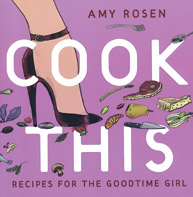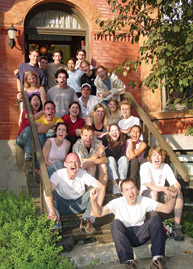Newsbites (Page 4)
Food for the Fearful

Freelance journalist and super-foodie Amy Rosen, BA'92, has a mission in life. She's taking the cooking challenged and leading them gently to a level of culinary sophistication they probably never dreamed of achieving.
Rosen, who writes about food and entertaining for such publications as enRoute magazine, the Globe and Mail and the National Post, also has two cookbooks under her belt. The first, Generation Eats, was put together because she pitied the many non-cooks among her friends. In her introduction Rosen says, "It kills me to see them ordering in lousy food when they can be cooking themselves a great dinner in half the time it takes the delivery guy to show up with the soggy pizza box." Subtitled Great Recipes for a Fast Forward Culture, the book draws on her Film and Communications studies at McGill, pairing recipes with videos to watch once the food is ready (broccoli cheddar soup with Bambi, chili with Blazing Saddles).
Her latest book, Cook This: Recipes for the Goodtime Girl, takes timid chefs out of the let's-stay-home-and-watch-a movie cocoon and introduces the art of entertaining. Ostensibly aimed at those who've just moved out of student digs ("Congratulations. Your living space now has multiple rooms - one of which is even a kitchen!") and survival cooking mode, Rosen's new book contains 200 pages of mouth-watering recipes that any cook would be pleased to serve.
She starts with flat-out basics, outlining what equipment and staples beginners need to stock a kitchen (including leopard-print oven mitts) and providing definitions for such exotic terms as "boil," "chop" and "garnish." But don't be fooled: Rosen is a graduate of the Cordon Bleu cooking school and has been nominated for a James Beard Award for her food writing. The recipes that follow are designed "to amaze family and friends" with minimum effort and without expensive appliances. ("No Mixmaster required... just good upper body strength.")
The fare in Cook This is eclectic, ranging from trailer-trash toppings for burgers, like peanut butter or cheese-in-a-can, to ostrich carpaccio and eggplant caviar. Filled with sassy asides and quirky tips (leftover shrimp can be turned into earrings), the book debunks the notion that producing impressive meals requires hours of painstaking labour. Cook This? You sure can.
Psyched Up for Epic Journey

Race participants at the end of the Epic Journey.
Courtesy John Abela
Psychology students should be thankful Professor John Abela didn't take NBC's gross-out show Fear Factor as his inspiration for a team-building event. McGill's first-ever "Epic Journey" was instead based loosely on the hit show The Amazing Race, with 22 of Abela's Psychology lab and research assistants as the competitors. The students, divided into five teams, chased around Montreal for three days at the start of the new semester in an obstacle race that included locating dragonfruit in Chinatown, rock-climbing, traveling to historic monuments and lining up at famed Schwartz's deli for Montreal smoked meat.
"The Epic Journey was intended to build team spirit, foster cooperation and allow new lab members to get to know each other better," says Abela. "In order to do well, teams had to be 100% in synch with one another - working as one well-oiled machine. And for a large lab such as mine to function well, all members of the lab must be working as one. I got to know these students better than I have gotten to know students I've worked with in the lab for years, because I saw them in all of their forms. They were truly all superstars."
Teams were eliminated over the course of the race, says Abela, and those members "became 'mischievous elves' who helped me out with the remainder of the race and had the opportunity to have fun and bond with other 'elves'." And the winners? Officially they were Team North America, but from Abela's assessment of the race, everyone came out ahead.
"Students learned important lessons about communication and teamwork. They pushed themselves physically and mentally to the extreme and accomplished tasks they never imagined possible. I am so proud of all who participated. I will never look at any of them in the same way again."


